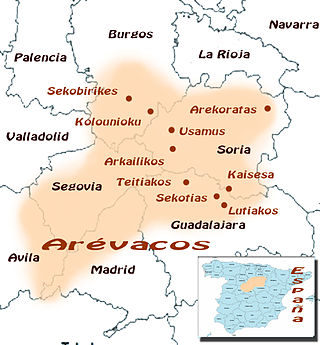Arevaker
The Arevacians (Spanish: Arévacos ; also called Arvatkos or Areukas in ancient sources ) were a Celtiberian tribal group in the center and north of the Iberian Peninsula . The largest and probably most important city in their settlement area was Numantia .
etymology
So far there are two etymological derivations of the name Arevaker - one refers to the traditional name of a tribe of the Vaccaeans ( Are-Vaccei would roughly mean "Northern Vaccaeans"); the other comes from Pliny the Elder , who derives the tribal name from a river named Areva or Araviana . The names of other traditional Celtiberian tribes are Beller , Avaker , Tittier , Lusonen , Lusitaner and the like. a.
history
Despite poor sources and only a few archaeological finds, research largely agrees that Celtiberian tribes have been around since around 1000 BC. Were resident in the region of the Iberian Meseta . They only came into historical consciousness through their years of resistance against the Romans . In the Celtiberian War (197-179 BC) the Arevacians do not seem to have been involved. In the Spanish War (154-133 BC), a sideline of the Third Punic War (149-146 BC), the Romans tried to Romanise the country and keep it away from Carthaginian influences. After the initial successes of the Arevacians and their allied tribes against the Roman armies, Scipio Africanus the Younger conquered in 133 BC. The city of Numantia, enslaved the population and let the city drag. In the years 99–81 BC There were renewed uprisings by Celtiberian tribes, but these were suppressed by the proconsul Titus Didius . In the Cantabrian War (29–19 BC) the Arevacians provided a troop of horsemen ( Ala Hispanorum Arevacorum ). Whether they participated in the assassination of the praetor Lucius Calpurnius Piso in 25 BC. Were involved is unclear.
Places / settlement areas
- Numantia ( Garray )
- Arcóbriga ( Monreal de Ariza )
- Arekoratas ( Ágreda ?)
- Clunia ( Coruña del Conde )
- Cortona ( Medinaceli ?)
- Kolounioukou ( Peñalba de Castro )
- Segontia Lanka ( Langa de Duero )
- Lutiakos ( Luzaga )
- Segontia ( Sigüenza )
- Termantia , Termes ( Montejo de Tiermes )
- Uxama (near El Burgo de Osma )
- Voluce ( Calatañazor )
Other traditional names of Arevakian places such as Nova Augusta , Tukris , Malia , Belgeda , Kolenda and Lutia have not yet been geographically identified.
See also
literature
- Alberto José Lorrio Alvarado: Los Celtíberos. Universidad Complutense de Madrid, Murcia 1997, ISBN 84-7908-335-2 .
- Francisco Burillo Mozota: Los Celtíberos. Etnias y estados. Crítica, Barcelona 1998 ISBN 84-7423-891-9 .
Web links
- Arevaker, history - info (spanish)
- Arevaker, History - Info ( Memento from March 9, 2010 in the Internet Archive ) (Spanish)
- Article about Uxama and Tiermes - information ( Memento from May 12, 2009 in the Internet Archive ) (Spanish)
